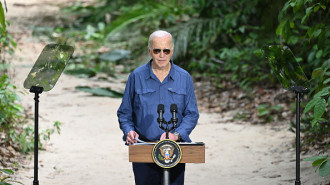Qatar says it will not normalise with Syria after Arab League reinstates Assad regime
Qatar, an outspoken opponent of President Bashar al-Assad, said on Sunday it would not normalise relations with the Syrian regime despite its readmission to the Arab League.
The Gulf emirate has long argued against renewing ties with Syria but fell in with the unanimous consensus at an Arab League foreign ministers' meeting in Cairo earlier Sunday.
The Arab bloc ended a more than decade-long suspension of Syria.
Qatar's position on "normalisation with the Syrian regime has not changed," said foreign ministry spokesman Majid bin Muhammad Al-Ansari.
He told the state Qatar News Agency that the government would not be "an obstacle" to the Arab League move but any individual normalisation would be linked to political progress that "fulfills the aspirations of the brotherly Syrian people."
Assad's government must "address the roots of the crisis that led to its boycott, and to take positive steps towards addressing the issues of the Syrian people," the spokesman added.
Syria was suspended from the Arab League in 2011 after Assad ordered a brutal crackdown on a pro-democracy uprising, which spiralled into a conflict that has killed more than 500,000 people, displaced millions, and drew in foreign powers.
While Syria's front lines have mostly quietened, large parts of the country's north remain outside government control, and no political solution has yet been reached to the 12-year-old conflict.
Ahmed Aboul Gheit, head of the 22-member Arab League, said Syria's return to the body is "the beginning... not the end of the issue", he added, noting it was up to individual countries to decide whether to resume ties with Damascus.
Qatar has given significant support to Syrian opposition groups which have taken over the Syrian embassy in Doha.
Even as other Arab countries moved toward renewing ties with Assad's government, the Qatari spokesman condemned to the Qatari media what he called "crimes" by the Damascus government and added that "We need a real price to be paid to the Syrian people."







 Follow the Middle East's top stories in English at The New Arab on Google News
Follow the Middle East's top stories in English at The New Arab on Google News


